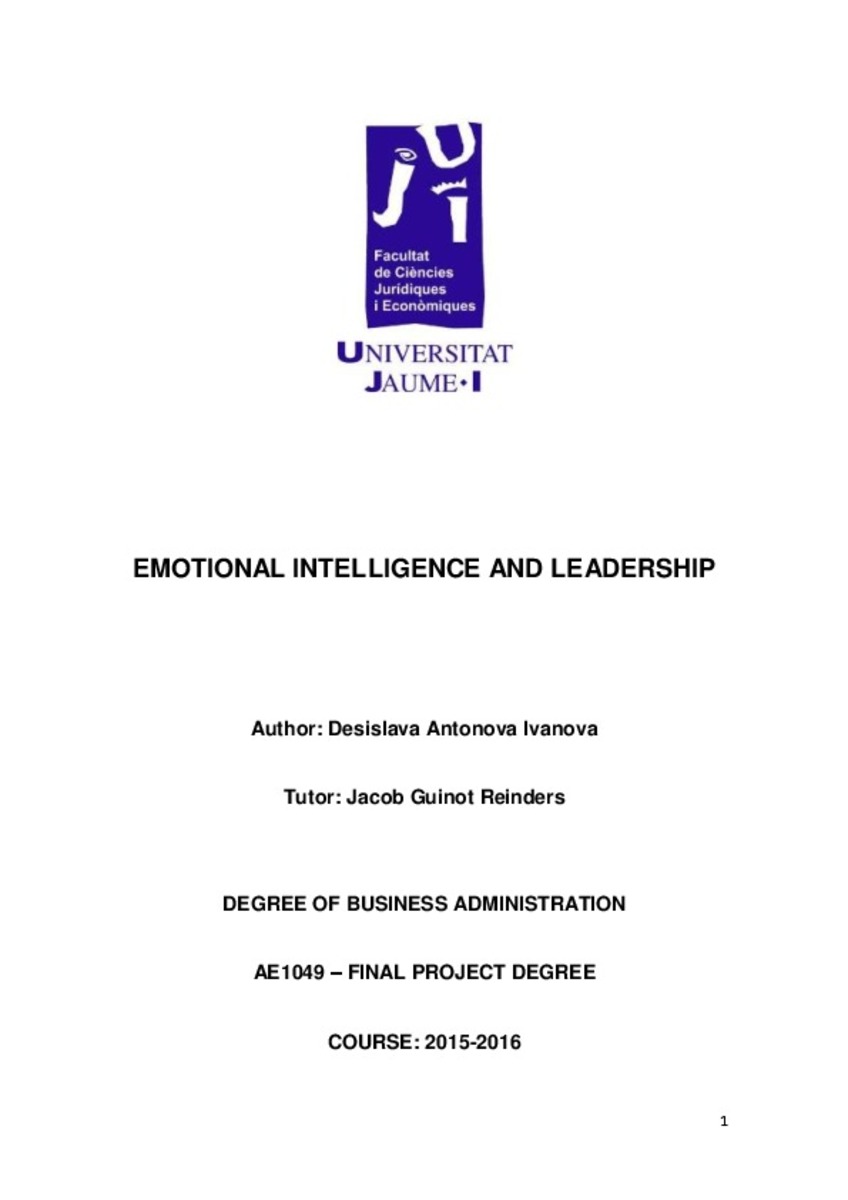Mostrar el registro sencillo del ítem
Emotional intelligence and leadership
| dc.contributor | Guinot, Jacob | |
| dc.contributor.author | Antonova Ivanova, Desislava | |
| dc.contributor.other | Universitat Jaume I. Departament d'Administració d'Empreses i Màrqueting | |
| dc.date.accessioned | 2016-11-16T11:31:27Z | |
| dc.date.available | 2016-11-16T11:31:27Z | |
| dc.date.issued | 2016-07-12 | |
| dc.identifier.uri | http://hdl.handle.net/10234/164471 | |
| dc.description | Treball Final de Grau en Administració d'Empreses. Codi: AE1049. Curs acadèmic 2015-2016 | ca_CA |
| dc.description.abstract | Purpose: The main purpose of this document is to evaluate claims that emotional intelligence is significantly related to transformational and transactional leadership behaviour and also to analyse and explore the importance of emotional intelligence and the ability to manage our emotions in order to be more successful in every organization and personal life. In order to do so, the document first seeks to clarify the idea of emotional intelligence and all the components, identifying the importance and benefits of this type of intelligence in organizations. Design/ methodology / approach: This document represents a theoretical review of emotional intelligence, starting from the need to understand what it is, how to understand it, how to improve it, what are the benefits in organizations and what types of leadership use to be more emotional intelligent. In this document are used references to existing literature related to emotional intelligence and leadership. This references are obtained from the database of the University Jaume I. Findings: Emotional Intelligence has a positive impact on organizations. Emotional intelligence is the key to our relationships and interactions are successful and are beneficial for all parties involved. Individuals with high emotional intelligence are able to cope with different situations in a much more effective way. They are also able to manage stress and cope with the changes happening within companies. Emotional intelligence also influence on the physical and mental health. The emotional fitness is important especially in leadership role whose essence is getting others to execute their jobs more effectively. In addition, it has been found that the transformational and transactional leader have certain traits that match the dimensions of emotional intelligence. | ca_CA |
| dc.format.extent | 33 p. | ca_CA |
| dc.format.mimetype | application/pdf | ca_CA |
| dc.language.iso | eng | ca_CA |
| dc.publisher | Universitat Jaume I | ca_CA |
| dc.rights | Atribución-CompartirIgual 4.0 España | * |
| dc.rights.uri | http://creativecommons.org/licenses/by-sa/4.0/ | * |
| dc.subject | Grau en Administració d'Empreses | ca_CA |
| dc.subject | Grado en Administración de Empresas | ca_CA |
| dc.subject | Bachelor's Degree in Business Administration | ca_CA |
| dc.subject | emotional intelligence | ca_CA |
| dc.subject | leadership | ca_CA |
| dc.subject | transactional leadership | ca_CA |
| dc.subject | transformational leadership | ca_CA |
| dc.subject | emotions | ca_CA |
| dc.subject | factors of emotional intelligence | ca_CA |
| dc.subject | benefits of emotional intelligence | ca_CA |
| dc.title | Emotional intelligence and leadership | ca_CA |
| dc.type | info:eu-repo/semantics/bachelorThesis | ca_CA |
| dc.educationLevel | Estudios de Grado | ca_CA |
| dc.rights.accessRights | info:eu-repo/semantics/openAccess | ca_CA |
Ficheros en el ítem
Este ítem aparece en la(s) siguiente(s) colección(ones)
-
Grau en Administració d'Empreses [705]
AE1049








